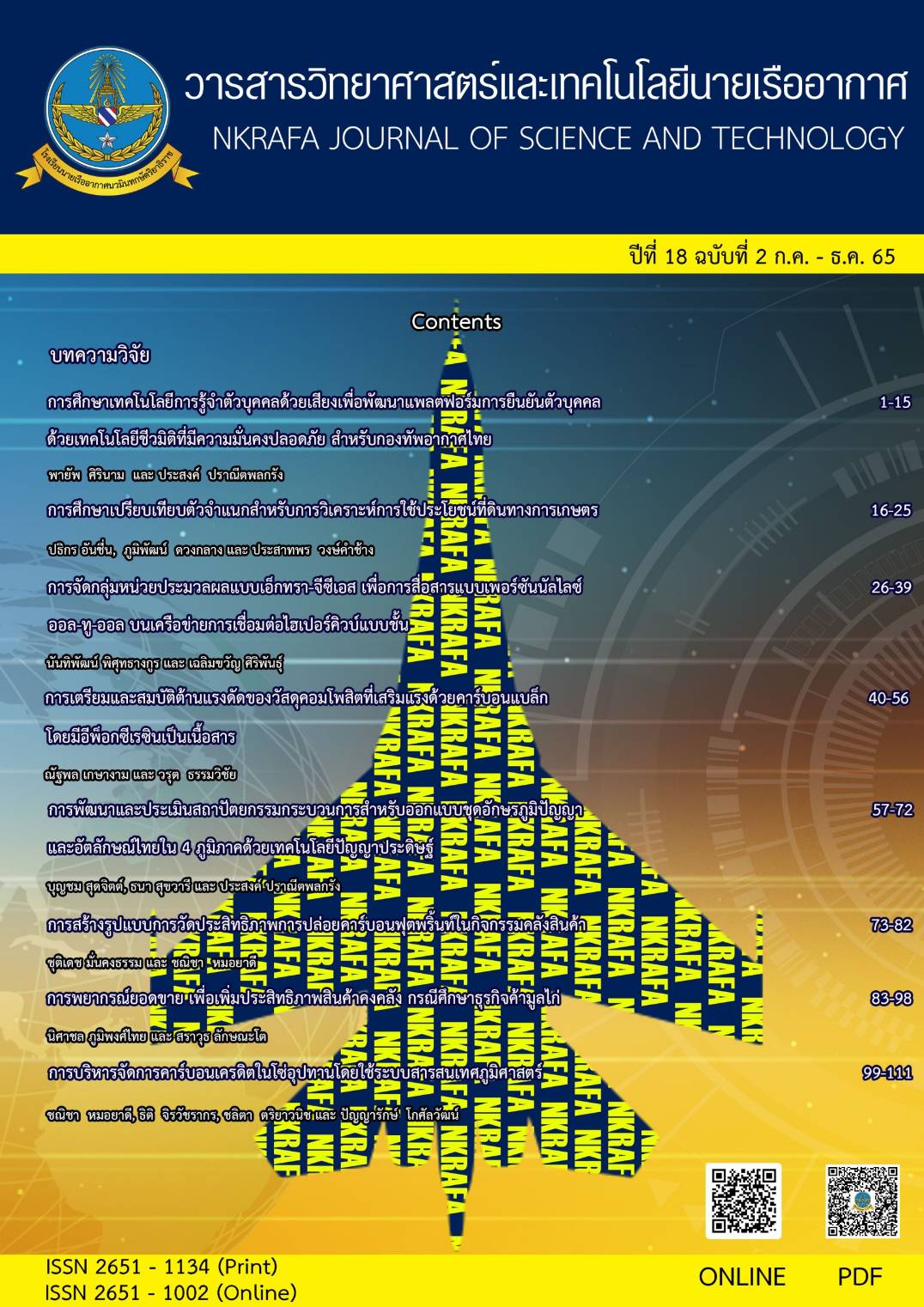Creating the Efficiency Measure Model of the Carbon Footprint inWarehouse Activities
Main Article Content
Abstract
Trend of world's carbon footprint is likely to increase due to economic development since the Industrial Revolution. This makes the risk of climate change more trend severe in all regions of the world. The important is aspect the carbon footprint emissions from the manufacturing sector which around the world, they has tried to solve the problem by showing information "Carbon Footprint" organization. During the past 10 years in filed Logistics, they give a lot of attention. According to the requirement of Management team to connect between supply and demand in trade and investment. But on the other hand, carbon footprint emissions from activities Logistics does not have a clear system or format to manage in this section. This article aims to present a model for measuring carbon footprint efficiency in warehouse activities. Action steps by reviewing the literature and related research to create a pattern of warehouse activities Subsequently, it was used to design a model for measuring the efficiency of carbon footprint emissions in warehouse activities. using formulas and calculation methods from the Greenhouse Gas Management Organization. From the results of the study we found that The main warehouse activities can be classified as 1.Receiving 2.Storage 3.Picking 4.Shipping 5.Delivery. It will be measured divided into 3 SCOPE. So there should be a small study of the activities of each main activity.
Article Details

This work is licensed under a Creative Commons Attribution-NonCommercial-NoDerivatives 4.0 International License.
- Content and information in articles published in NKRAFA Journal of Science and Technology are comment and responsibility of authors of articles directly. Journal editorial do no need to agree or share any responsibility.
- NKRAFA Journal of Science and Technology Articles holds the copyright of the content, pictures, images etc. which published in it. If any person or agency require to reuse all or some part of articles, the permission must be obtained from the NKRAFA Journal of Science and Technology.
References
องค์การบริหารจัดการก๊าซเรือนกระจก (องค์การมหาชน). (2565). แนวทางการประเมินคาร์บอนฟุตพริ้นท์องค์การ.
สืบค้น 10 กันยายน 2565, จาก http://www.tgo.or.th/2020/index.php/th/
สำนักงานนโยบายและแผนทรัพยากรธรรมชาติและสิ่งแวดล้อม. (2565). รายงานสถานการณ์คุณภาพสิ่งแวดล้อม.
สืบค้น 10 กันยายน 2565, จาก http://www.onep.go.th/
Ries, J. M., Grosse, E. H., & Fichtinger, J. (2017). Environmental impact of warehousing: A scenario analysis
for the United States. International Journal of Production Research. Retrieved on September 10, 2022, from
https://www.researchgate.net/publication/304798587_Environmental_impact_of_warehousing_A_scenario_
analysis_for_the_United_States
จิตลดา หมายมั่น และคณะ. (2560). คาร์บอนฟุตพริ้นท์ขององค์กร. วารสารวิชาการมหาวิทยาลัยอีสเทิร์นเอเชีย ฉบับวิทยาศาสตร์
และเทคโนโลยี, 11(1): 57-66.
David Martin Herold & Ki-Hoon Lee. (2017). Carbon management in the logistics and transportation sector: an overview
and new research directions. Retrieved on September 12, 2022, from https://www.tandfonline.com/doi/full/
1080/17583004.2017.1283923
เกียรติกุลไชย จิตต์เอื้อ. (2018). ปัญหาการจัดเส้นทางการขนส่งภายใต้ความไม่แน่นอนของอุปสงค์. วารสารวิทยาศาสตร์
และเทคโนโลยีนายเรืออากาศ, ปีที่ 13: 19-24. สืบค้น 12 กันยายน 2565, จาก https://ph02.tci-thaijo.org/index.php/
nkrafa-sct/article/view/141988
Maicol Bartolini, Eleonora Bottani, Eric H. Grosse. (2019). Green warehousing: Systematic literature review
and bibliometric analysis. Journal of Cleaner Production. Volume 226: 242-258. Retrieved on September 12, 2022, from
https://www.researchgate.net/publication/332267753_Green_warehousing_Systematic_literature_review_
and_bibliometric_analysis
Rajeev, A., Rupesh, K.Pati., Sidhartha, S.Padhi. & Kannan Govindan. (2017). Evolution of sustainability in supply chain
management: A literature review. Journal of Cleaner Production. Volume 162. Retrieved on September 12, 2022,
from https://www.sciencedirect.com/science/article/abs/pii/S0959652617309514?via%3Dihub
Johannes Fichtinger, Jörg M. Ries, Eric H. Grosse & Peter Baker, (2015). Assessing the environmental impact of
integrated inventory and warehouse management. International Journal of Production Economics, Elsevier.
Volume 170: 717-729. Retrieved on September 12, 2022, from https://ideas.repec.org/a/eee/proeco/v170y2015ipcp717-729.html
Shao Hung Goh. (2019). Barriers to Low-Carbon Warehousing and the Link to Carbon Abatement: A Case from
Emerging Asia. International Journal of Physical Distribution & Logistics Management. Volume 49. Retrieved on
September 15, 2022, from https://www.emerald.com/insight/content/doi/10.1108/IJPDLM-10-2018-0354/full/html
Xu Chen, Xiaojun Wang, Vikas Kumar, Niraj Kumar. (2016). Low carbon warehouse management under
cap-and-trade policy. Journal of Cleaner Production. Volume 139. Retrieved on September 15, 2022, from
https://www.sciencedirect.com/science/article/abs/pii/S0959652616312379?via%3Dihub
Accorsi, R., Bortolini, M., Gamberi, M., Manzini, R. & Pilati, F. (2017). Multi-objective warehouse building design to optimize
the cycle time, total cost, and carbon footprint. The International Journal of Advanced Manufacturing Technology.
Volume 92. Retrieved on September 15, 2022, from https://link.springer.com/article/10.1007/s00170-017-0157-9
Lewczuk, K., Klodawski, M. & Gepner, P. (2021). Energies. Retrieved on September 15, 2022, from https://www.mdpi.com/
-1073/14/9/2709
Lilyana Mihova. (2020). FIELDS OF APPLICATION OF ENERGY EFFICIENT WAREHOUSE PRACTICES.
Knowledge International Journal. Retrieved on September 18, 2022, from https://www.researchgate.net/publication/344339648_
FIELDS_OF_APPLICATION_OF_ENERGY_EFFICIENT_WAREHOUSE_PRACTICES
Francielly Hedler Staudt, Alpan, G., Di Mascolo, M. & Rodriguez, C. (2015). Warehouse performance measurement:
a literature review. International Journal of Production Research, Taylor & Francis Journals. Volume 53(18).
Retrieved on September 18, 2022, from https://ideas.repec.org/a/taf/tprsxx/v53y2015i18p5524-5544.html


